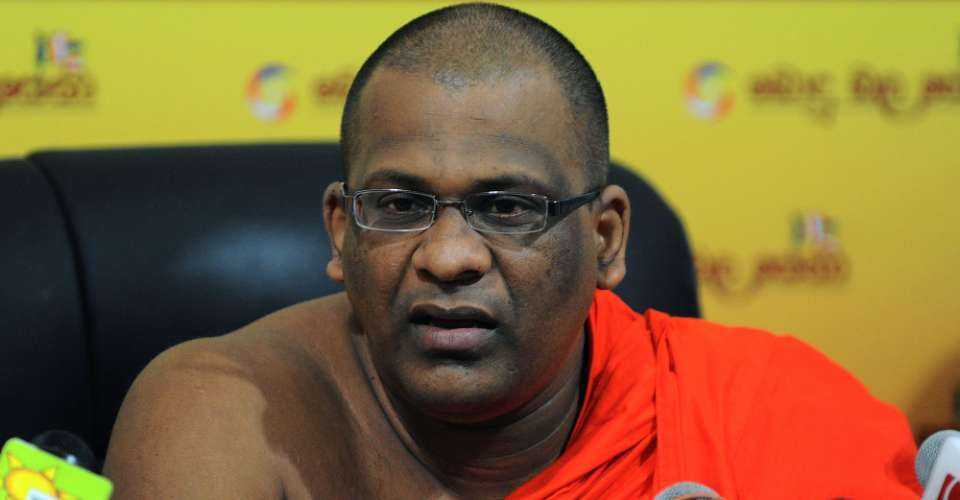
Buddhist monk Galagodaaththe Gnanasara Thera is seen during a press conference in Colombo in this file image. (Photo: AFP)
A court in Sri Lanka has sentenced an influential Buddhist monk to four years in jail after convicting him of defaming Islam with his public comments seven years ago.
The Colombo High Court on March 28 sentenced Galagodaaththe Gnanasara Thera, general secretary of the Bodu Bala Sena (BBS or Buddhist Power Force), a hardline Buddhist group.
The court also fined him 100,000 rupees (US$333).
The court observed that the monk’s comments, made during a media conference in 2016, had contributed to religious and communal discord in the country.
The firebrand monk has been accused of running a campaign against religious minorities since 2012 in the Buddhist-majority nation.
The monk was arrested in 2018 for contempt of court for allegedly shouting at a judge and was sentenced to six years imprisonment.
However, he secured a presidential pardon within a few months after Buddhist monks and politicians petitioned for him.
During his last court appearance in February, he reportedly issued a public apology to Muslims and said he was not against the community.
Activists say the monk’s hate speech against Islam contributed to increased incidents of intolerance and violence against religious minorities in recent years.
“The spread of hate speech presents a serious challenge to the cherished harmony and stability of the nation,” according to Susira Rupasinghe, a Christian pastor based in Colombo.
Hate speeches continue despite the country enacting laws and adopting international conventions, that criminalize “incitement to discrimination, hostility, or violence based on racial, national, or religious grounds,” he said.
In recent years, hardline Buddhist groups have been accused of defaming minority groups and attacking Muslim and Christian worship places.
In 2014, 2018, and 2019, Buddhist mobs attacked Muslim worship places and shops in various parts of the country after being incited by hardline monks and Buddhist groups.
In 2014, anti-Muslim riots in the coastal town of Aluthgama left three dead and 17 mosques vandalized.
Naveesha Surini, a Muslim university student from Colombo, whose family shop was attacked in an anti-Muslim riot, said punishing Gnanasara is a welcome step in addressing the culture of impunity among individuals inciting hate speech.
Education, responsible media reporting, and strong governmental action against online extremism can check hate crimes, she said.
“Citizens also play a crucial role in reporting instances of hate speech and promoting positive change,” Surini said on April 1.
Muslims came under renewed hate speeches and attacks following the 2019 Easter Sunday bombings by a local Muslim extremist outfit.
Local media reported a series of attacks targeting mosques, Muslim-owned houses and businesses in various cities after the Easter carnage.
Of Sri Lanka’s 21 million people, 70 percent are Buddhist, 13 percent Hindu, 10 percent Muslim and 7 percent Christian.
source : uca news
